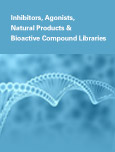Anaplastic lymphoma kinase (ALK), also known as CD246, is a receptor tyrosine kinase having a putative transmembrane domain and an extracellular domain. ALK activation is involved in the carcinogenesis process of several human cancers such as anaplastic large cell lymphoma, lung cancer, inflammatory myofibroblastic tumors and neuroblastoma, as a consequence of fusion with other oncogenes (NPM, EML4, TIM, etc) or gene amplification, mutation or protein overexpression.
Specific inhibitors, such as crizotinib, ceritinib, alectinib etc., has demonstrated significant effectiveness in ALK-positive patients, in particular ALK-positive non- small cell lung cancer. The EML4-ALK fusion gene is responsible for approximately 3-5% of non-small-cell lung cancer(NSCLC). The vast majority of cases are adenocarcinomas. Crizotinib is a first-in-class ALK tyrosine kinase inhibitor (TKI), which has proven its superiority over standard platinum-based chemotherapy for the first-line therapy of ALK-rearranged non-small cell lung cancer (NSCLC) patients. Ceritinib and alectinib are approved second-generation ALK TKIs. Several novel ALK inhibitors, more potent and with different selectivity compared to crizotinib, are currently in development.
References:
1. Della Corte CM, et al. Mol Cancer. 2018 Feb 19;17(1):30.
2. Wu W, et al. Cancers (Basel). 2017 Nov 30;9(12). pii: E164.
3. Muller IB, et al. Onco Targets Ther. 2017 Sep 13;10:4535-4541.
4. Karachaliou N, et al. Expert Opin Investig Drugs. 2017 Jun;26(6):713-722.













